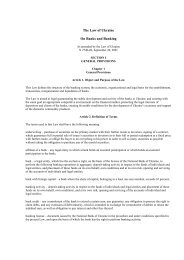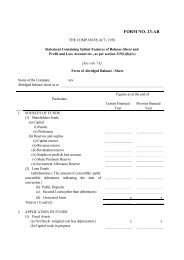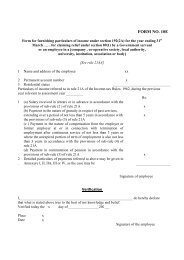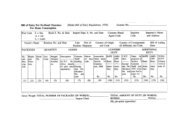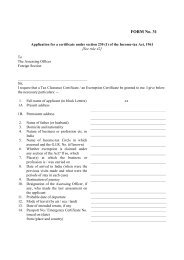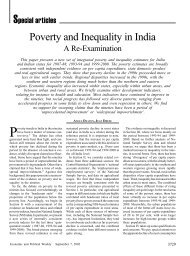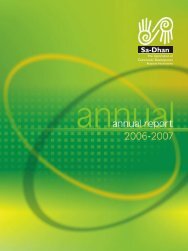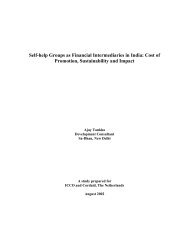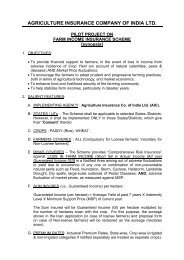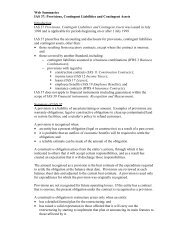Web Summaries IAS 8: Accounting Policies, Changes in Accounting ...
Web Summaries IAS 8: Accounting Policies, Changes in Accounting ...
Web Summaries IAS 8: Accounting Policies, Changes in Accounting ...
You also want an ePaper? Increase the reach of your titles
YUMPU automatically turns print PDFs into web optimized ePapers that Google loves.
<strong>Web</strong> <strong>Summaries</strong><strong>IAS</strong> 8: <strong>Account<strong>in</strong>g</strong> <strong>Policies</strong>, <strong>Changes</strong> <strong>in</strong> <strong>Account<strong>in</strong>g</strong> Estimates and ErrorsIntroduction<strong>IAS</strong> 8 <strong>Account<strong>in</strong>g</strong> <strong>Policies</strong>, <strong>Changes</strong> <strong>in</strong> <strong>Account<strong>in</strong>g</strong> Estimates and Errors was issued<strong>in</strong> December 2003 and is applicable for annual periods beg<strong>in</strong>n<strong>in</strong>g on or after 1January 2005.<strong>IAS</strong> 8 prescribes the criteria for select<strong>in</strong>g and apply<strong>in</strong>g account<strong>in</strong>g policies, andaccount<strong>in</strong>g for changes <strong>in</strong> account<strong>in</strong>g policies, changes <strong>in</strong> account<strong>in</strong>g estimates andcorrections of prior period errors.Summary of <strong>IAS</strong> 8When a Standard or an Interpretation (hereafter “IFRS”) specifically applies to atransaction, event or condition, the account<strong>in</strong>g policy applied to that item isdeterm<strong>in</strong>ed by apply<strong>in</strong>g the IFRS and consider<strong>in</strong>g any relevant ImplementationGuidance for the IFRS.<strong>Account<strong>in</strong>g</strong> policies need not be applied when the effect of apply<strong>in</strong>g them isimmaterial, as def<strong>in</strong>ed <strong>in</strong> <strong>IAS</strong> 1 Presentation of F<strong>in</strong>ancial Statement.In the absence of an IFRS that specifically applies to a transaction, event or condition,management uses its judgement <strong>in</strong> select<strong>in</strong>g and apply<strong>in</strong>g an account<strong>in</strong>g policy thatresults <strong>in</strong> relevant and reliable f<strong>in</strong>ancial <strong>in</strong>formation. <strong>IAS</strong> 8 specifies the follow<strong>in</strong>ghierarchy of guidance which management uses when select<strong>in</strong>g account<strong>in</strong>g policies <strong>in</strong>such circumstances:• requirements of Standards and Interpretations deal<strong>in</strong>g with similar matters;• the def<strong>in</strong>itions, recognition criteria and measurement concepts for assets,liabilities, <strong>in</strong>come and expenses <strong>in</strong> the Framework for the Preparation andPresentation of F<strong>in</strong>ancial Statements;• the most recent pronouncements of other standard-sett<strong>in</strong>g bodies that use a similarconceptual framework, other account<strong>in</strong>g literature and accepted <strong>in</strong>dustry practices,to the extent that these do not conflict with IFRSs and the Framework. .An entity applies its account<strong>in</strong>g policies consistently for similar transactions, otherevents and conditions, unless an IFRS specifically requires or permits categorisationof items for which different policies may be appropriate.An entity changes an account<strong>in</strong>g policy only if the change is required by an IFRS, orresults <strong>in</strong> the f<strong>in</strong>ancial statements provid<strong>in</strong>g more relevant and reliable <strong>in</strong>formationabout the entity’s f<strong>in</strong>ancial position, f<strong>in</strong>ancial performance or cash flows. A change<strong>in</strong> account<strong>in</strong>g policy, result<strong>in</strong>g from the <strong>in</strong>itial application of an IFRS, is accountedfor <strong>in</strong> accordance with any specific transitional provisions of that IFRS. Otherwise achange <strong>in</strong> account<strong>in</strong>g policy is applied retrospectively to all periods presented <strong>in</strong> thef<strong>in</strong>ancial statements as if the new account<strong>in</strong>g policy has always been applied.The effect of a change <strong>in</strong> an account<strong>in</strong>g estimate is recognised prospectively <strong>in</strong> profitor loss <strong>in</strong> the period of the change, and also <strong>in</strong> profit or loss <strong>in</strong> future periods if thechange affects both periods. Any correspond<strong>in</strong>g changes <strong>in</strong> assets and liabilities, or toan item of equity, are recognised by adjust<strong>in</strong>g the carry<strong>in</strong>g amount of the asset,liability or equity item <strong>in</strong> the period of the change.
<strong>Web</strong> <strong>Summaries</strong><strong>IAS</strong> 8: <strong>Account<strong>in</strong>g</strong> <strong>Policies</strong>, <strong>Changes</strong> <strong>in</strong> <strong>Account<strong>in</strong>g</strong> Estimates and ErrorsA material prior period error is corrected retrospectively <strong>in</strong> the first set of f<strong>in</strong>ancialstatements authorised for issue after its discovery. The comparative amounts for theprior period(s) presented <strong>in</strong> which the error occurred are restated; or if the erroroccurred before the earliest period presented, the open<strong>in</strong>g balances of assets, liabilitiesand equity for the earliest prior period presented are restated.<strong>IAS</strong> 8 specifies the account<strong>in</strong>g treatment when it is impracticable to account for achange <strong>in</strong> account<strong>in</strong>g policy or a correction of a prior period error us<strong>in</strong>g retrospectiverestatement <strong>in</strong> accordance with the Standard.<strong>IAS</strong> 8 also specifies disclosures about account<strong>in</strong>g policies, changes <strong>in</strong> account<strong>in</strong>gestimates and errors.



